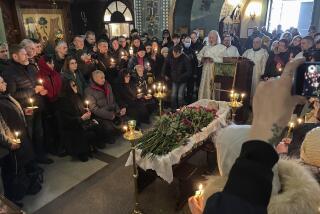Radicals Expected to Strike During Hirohito Rites : Japan Girds for Violence at Funeral
- Share via
TOKYO — The “Imperial Funeral Excess Security Hot Line” rings steadily these days in Hachioji, a suburb on the western outskirts of the capital where the late Emperor Hirohito is to be buried next week.
Most of the calls are threatening, apparently made by right-wing extremists with little tolerance for any criticism of Japan’s millennium-and-a-half-old emperor system, the hot line’s operators say. But about a fifth of them come from citizens who either praise the service or complain that their rights were violated in an encounter with some of the 24,000 police officers combing Tokyo for terrorists.
Authorities are convinced that leftist radicals will strike with some sort of violence--most likely bombs or rockets--when foreign dignitaries from 150 countries, including President Bush and 54 other heads of state, descend upon the city to attend the state funeral next Friday.
Rocket Attack Still Rankles
Police are still furious about a rocket attack that fizzled harmlessly during the Tokyo Economic Summit of seven major industrial powers three years ago, and they are embarrassed about a midnight bomb blast Feb. 3 that caused minor damage at a Shinto shrine about a mile from the park where the funeral will be held. They are taking no chances. An additional 8,000 men will soon be deployed as part of a special force of 32,000 officers, several thousand more than at the May, 1986, summit.
Roadblocks have been erected. Shipments of domestic air cargo will be banned for a five-day period to prevent bombs. Traffic will be completely shut off near the route of the funeral procession next Friday. A squadron of helicopters and a helium-filled blimp will patrol from the sky.
Tokyo is taking on the atmosphere of a city under siege, with uniformed policemen posted in places they are rarely ever seen, like subway platforms and apartment block playgrounds. Cops are knocking on doors, asking for “cooperation” in spot searches and passing out color leaflets with cartoons depicting suspicious behavior that should be reported to authorities.
“It is certain that the ultra-leftists are going to cause some trouble,” said a senior superintendent at the National Police Agency’s security bureau, who briefed foreign reporters Thursday on the condition his name not be printed. “It is necessary we take measures to protect life.”
Critics, however, say the authorities are going too far, and that their enthusiasm for surveillance and control brings back disturbing memories of Japan’s dark days of authoritarianism, which for some Japanese is symbolized by Emperor Hirohito, who since he died Jan. 7, has been known as the Emperor Showa.
“It’s true that the radicals go into action when foreign leaders come to town. There must be security measures,” said Wataru Yoshimura, a local labor leader in Hachioji who helped organize the hot line for complaints about police. “But there is no reason why ordinary citizens should be harassed.”
Yoshimura said his hot line has gotten about 400 calls since it went into service Feb. 1. When callers do not breathe menacingly or demand to know the office’s location--for the avowed purpose of torching it--they tell stories about nasty run-ins with the law.
Take the 19-year-old man from Ibaragi prefecture who was driving into Tokyo recently when police stopped him because a number was missing from his damaged license plate. When they demanded to search his trunk they found a wooden martial arts sword and a fruit knife. The man was arrested on the spot, Yoshimura said.
Mothers in Hachioji, where the imperial mausoleum is being constructed, complain that police have banished their children from public playgrounds, he said. Police in central Tokyo stopped a 16-year-old high school student in her school uniform and demanded to search her bag, Yoshimura said.
Since the emperor’s death six weeks ago, police have counted 974 “ultra-left” demonstrations against the emperor system attended by a total of 13,715 people, the police superintendent said. This funeral security dragnet has gotten results, too. Police arrested 68 suspected radicals on such charges as using false names on rental contracts.
Most of them--51--were accused of belonging to Kokurokyo, or the Revolutionary Workers’ Assn., a small underground group that claimed responsibility for bombing the shrine earlier this month. The alleged leader of Kokurokyo’s guerrilla faction, Etsuo Okazono, was nabbed on a bus while carrying blueprints of homemade rockets and diagrams of a government traffic-control dispatching facility, police said.
Group Lobbed Rockets
Another 17 suspects were associated with Chukaku-ha, or Middle Core Faction, the clandestine organization that fired rockets harmlessly over the roof of the official guest house in the 1986 summit. A leader of the group, which police believe has several thousand members, vowed in interviews with news agencies earlier this month to disrupt the Showa funeral.
The senior police superintendent conceded that the radicals have probably improved their technology since their last demonstration of homemade firepower. Projectiles are expected to fly farther than the 2.4-mile range achieved in the attack during the 1986 summit, and a similar gain has been made in explosive force, he said.
But the gravest cause for vigilance is the Japanese Red Army, a band of hardened, expatriate terrorists who began to show signs of renewed activity over the past year or so. Red Army operatives, based in Lebanon, were linked to the fatal bomb blast at a nightclub in Naples, Italy, last April.
Police are resigned to seeing some form of ritual violence that will disrupt the funeral, but they are hoping to prevent any lethal action.
“We figure we’ll get punched a little, somewhere,” said the police official. “But we’re determined there won’t be a knockout.”
More to Read
Sign up for Essential California
The most important California stories and recommendations in your inbox every morning.
You may occasionally receive promotional content from the Los Angeles Times.













